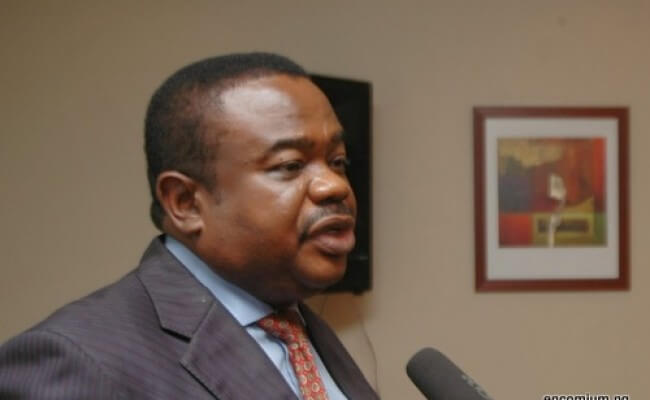An Ikeja High Court in Lagos State presided over by Justice A. M. Lawal in a ruling on March 25, 2020 in suit No. ID/ADR/2389/2019 has dismissed a case of defamation filed by Chief Tony Okoroji, the disputed Chairman of the Copyright Society of Nigeria Ltd/Gte (COSON), against Obi Ezeilo, the Director of Prosecution of the Nigerian Copyright Commission.
COSON, whose operating licence as a collecting society in music had lapsed since May 2019, is currently not approved to function as a collective management organisation (CMO).
Okoroji had filed the case against Ezeilo, a public servant, in his personal capacity, claiming, among others, general damages and special damages in the sum of N100 million for an alleged utterance of defamatory statements in a meeting held on the premises of Federal High Court, Enugu between Ezeilo and the legal counsel of COSON, following the latter’s request for discussions towards an amicable resolution of the case at the Federal High Court, Enugu Division.
The ruling of the Court was sequel to a preliminary objection filed and argued by the defendant, Ezeilo, urging the Court to dismiss the matter.
In addition to upholding the objection of the defendant, Justice Lawal also held that the Lagos State High Court does not have jurisdiction to entertain the matter.
The case at the Ikeja High Court is one of the several cases filed by Okoroji, COSON and some members of COSON against the NCC and some of its staff in the wake of the suspension by the Commission of the operating licence of COSON as a CMO in April 2018.
In December 2017, the Commission had received a petition from some members of COSON calling for investigation into an alleged irregularity in the conduct of an extraordinary general meeting of COSON on December 19, 2017.
Based on the outcome of the investigations, the Commission issued a directive to COSON, urging it not to implement certain resolutions of the extraordinary general meeting, which the Commission considered irregular.
The management of COSON disregarded the directive of the Commission, thereby leading to the suspension of the operating license of COSON.
The legal actions taken by Okoroji, COSON and some of its members, aimed at challenging the regulatory powers and functions of the NCC have mostly been dismissed and/or struck out by the Courts for want of merit.
Other cases filed by COSON and its members against the Commission and its officials, which the Courts have either dismissed or struck out, include: Suit No. FHC/EN/CS/58/18, Uchenna Stangley Anowo & 3 Ors v. Nigerian Copyright Commission & 14 Ors, where members of COSON loyal to Okoroji sued the Commission, its officials and some Directors of COSON at the Federal High Court, Enugu, asking the Court to invalidate the suspension of its licence; Suit No. FHC/EN/CS/116/18: Sir Angus Onyema Nwangwu & 3 Ors v. Nigerian Copyright Commission & 4 Ors, where members of COSON loyal to Okoroji sued the Commission and its staff at the Federal High Court, Enugu, asking for several relieves, including to quash the directive of the Commission suspending its licence; Suit No. FHC/L/CS/606/18: Copyright Society of Nigeria & 8 Ors v. Efe Omoreghe & 7 Ors, where COSON sued some of its Directors and the Commission, seeking several orders, including the return of its operating licence, which was suspended by the Commission.
The last case was dismissed on May 23, 2019.
In the wake of the serial failure of its several suits, COSON and Okoroji are alleged to have resorted to trumping up several false allegations and frivolous petitions against the leadership of the Commission and some of its officers, as well as engaging in negative media campaign over which the NCC has maintained its position of strict regulation of collective management operations in Nigeria to guaranty the needed transparency, accountability and good governance.
The Commission said its position takes into account the fact that the rights managed by CMOs belong to Nigerian and foreign creators and those rights should be managed in compliance with global best practices to safeguard them against capricious and abusive conduct.
Consequently, the Commission recently commissioned an international audit firm to carry out a full forensic audit of COSON as a precondition for renewal of its operating licence, which had lapsed in May 2019, following COSON’s application to the Commission.
COSON is, at the moment, not an approved collective management organisation and, therefore, not entitled to solicit for or license the use of creative works or collect royalties therefrom.
Section 39 (4) and (5) of the Copyright Act make it a punishable offence to perform the functions of a collecting society without the approval of the NCC.
Trending
- Obi hails Nigerian Police for withdrawing invitation to Emir Sanusi
- Protesters defy IG’s order, converge at Ikeja under-bridge
- Just In: Police fire teargas at peaceful protesters in Abuja
- Northern youths disown planned nationwide protest
- Four injured as vehicle falls off Otedola Bridge
- FAAN moves to stop manual checks at Lagos Airport
- US court jails two Nigerians, Texan over $4.9m tax refund fraud scheme
- Ambassadorial appointments: Ikpeazu, Ugwuanyi, Shehu Sani, Omokri, others make list


